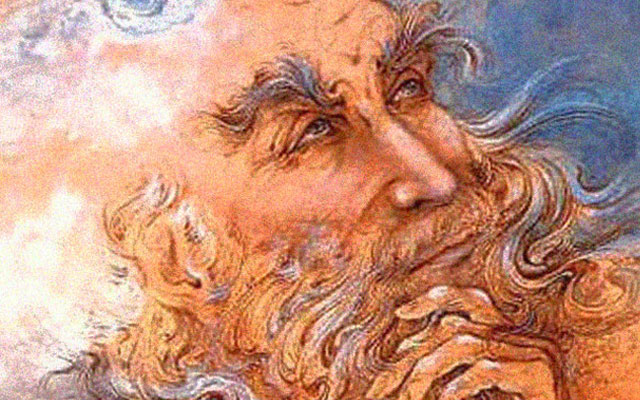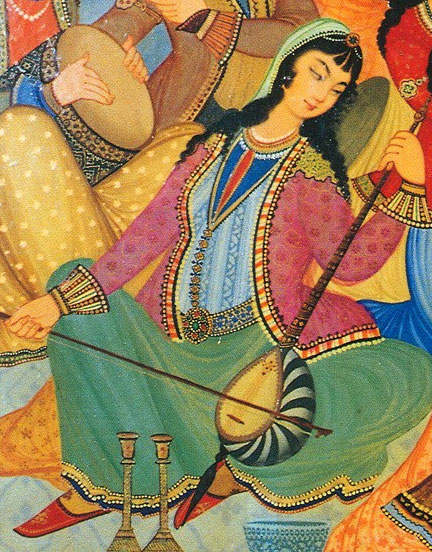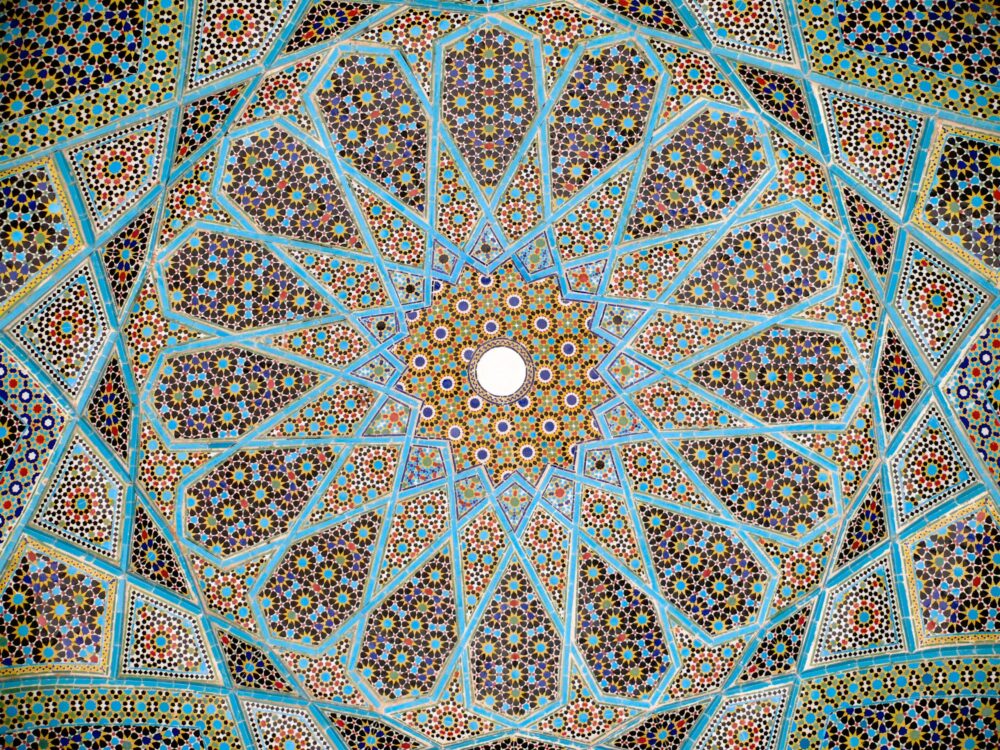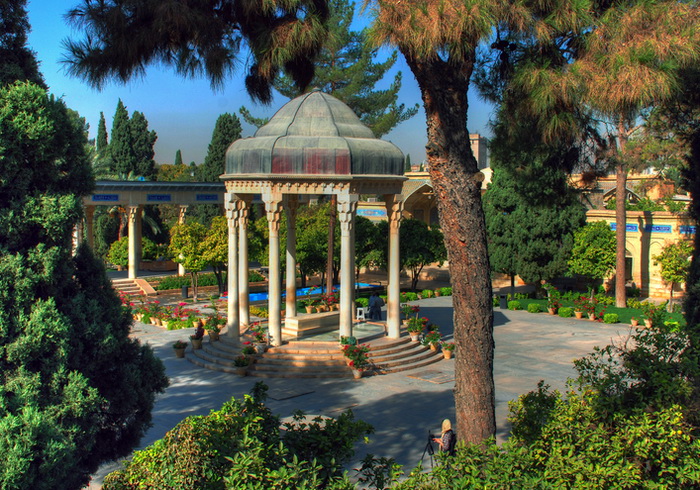
Rose petals let us scatter
And fill the cup with red wine
The firmaments let us shatter
And come up with a new design
The first post of this blog opens with Hafez (c. 1320, Shiraz -1389, Shiraz), the master of mystical Persian poetry who composed some 500 ghazals in praise of his Beloved.
Early Years
Born in Shiraz as Khajeh Shamseddin Mohammad, he later took the pen name Hafez (Hafiz) meaning the memorizer for he had memorized the Qu’ran in his teens, as well as the many works of Saadi, Attar, Rumi and Nizami.
The details of his life especially of his early years are not known by many.
Twenties, Falling in Love
Upon his father’s death, Hafez lived with his uncle during the years of war and famine. It is recounted that he left school to work in a bakery. He was in his early twenties when delivering bread in the wealthy neighborhood, he fell in love with a beautiful maiden, Shakh-e Nabat. He saw the manifestation of the Creator’s beauty in her face. Through his love for Shakh-e Nabat, he would allude to his divine Beloved and compose his ghazals in His praise.
The Encounter with Timur, the Emperor
Many miraculous events and mythical tales were woven around Hafez. One is his encounter with Timur, the chief of the Timurid Empire.
At the time, Timur was aspiring to dominate the region. He was making continuous attacks to conquer Persian provinces. The famous story recounts that when Timur sieged Shiraz, he had already heard the reputation of Hafez, his courage and intelligence, as well as his ghazals. Among them, a particular ghazal which he found to be offending, and angry as he was, he summoned Hafez to account for this poem :

Oh Turkish maid of Shiraz !
In thy hand
If thou’lt take my heart, for the mole
on thy cheek
I would barter Bokhara
and Samarkand.
Bring, Cup-bearer, all that is left
of thy wine !
In the Garden of Paradise vainly
thou’lt seek
The lip of the fountain of Ruknabad,
And the bowers of Mosalla
where roses twine.
Samarkand was Timur’s capital and Bokhara was the kingdom’s most beautiful city. Timur asked Hafez : “ I have conquered many lands around the globe to embellish Samarkand and Bokhara, how could you daresay give the two jewels of my crown for the mole on your lover’s cheek ? ” Hafez bowed and replied : “ Alas, O’ Seigneur, due to such foolish generosities that I became so poor ! ” So surprised and pleased was Timur with this response that he dismissed Hafez with handsome gifts.
His Poetry
Hafez composed some 500 ghazals and 42 rubaiyees (four-line poems) which were compiled by Mohammad Golandaam only after his death around 1410. Since then, the poems of Hafez had spread in the east and west. His Divan has become the subject of much analysis, commentary and interpretation. His ghazals are translated into all major languages. Having foreseen the outreach of his effect from the 14th unto the 21st century, Gertrude Bell (1868-1926), one of the pioneer translators of Hafez described him as follows :
Although he is from a different epoch, and a different civilization, in his ghazals, there is the melody of humankind who is the same everywhere…
His poems, couplets, are woven into everyday life of Persian people who recite them them by heart, and chant them. On special festive nights, upon randomly opening a page of his Divan, the reader draws a personal meaning. It is believed that the ghazal picked conveys a meaningful message to the reader, an indication of an important issue or the coming of a future happening. That is why Hafez is known as the keeper of the secret truth and the speaker of the hidden. To this day Hafez’s Divan is utilized as an Oracle to give guidance to our questions, and direction to realize our wishes.
Hafez’s courage and sincere faith are reflected in his ironic tone against all forms of bigotry – religious hypocrisy induced by religious taboos, and rules of the religious establishments of the time. He did not follow a strict religious doctrine. For Hafez, the Truth is another matter altogether. He annotates :
You who cannot leave your palace
How can you hope to reach the village of Truth?
Hafez considers each human being in its own right, regardless of his religion, and without any discrimination. He articulates :
Where is the music which the drunken and the sober both can dance?
For him, what really matters is the person’s intention, the purity of his heart and thought, not the religious appearances. In one of his ghazals, he proclaims :
None shall die whose heart has lived with the life love breathed into it; but when the day of reckoning comes, I fancy that the Sheikh will find that he has gained as little by his abstinence as I by my feasting.
Hafez’s poetry is defined by many as the apex of his intelligence, wit and profound sagacity. One can find the hidden meanings enfolded in metaphors, can catch a glimpse of the face of the divine Beloved twinkling inbetween the lines, or just hear his music seamlessly flowing through the verses. It is a vivid interplay of all in one.
What others said about him :
J. Wolfgang Goethe :
“ In his poetry, Hafez has inscribed undeniable truth indelibly…He has no peer ! ”
Ralph Waldo Emerson :
“ He fears nothing, He sees too far; he sees throughout, such is the only man I wish to see or be.”
Edward Fitzgerald :
“ The best musician of words. ”
His aim was to compose poetry worthy of the Beloved, without harboring any expectations in return. He said :
Serve not like a beggar in hopes of recompense
For the Lord Himself cares most for His servants
(Divan: ghazal #171, p. 81 in Paroles de Vérité)

Death
Hafez died in Shiraz (c.1389)
The orthodox clergy who always opposed Hafez, refused to allow him to have a proper muslim burial, which was strongly protested against by the people of Shiraz. To resolve the conflict, they decided to use Hafez’s poetry, and asked a young boy to draw one couplet. It was agreed that however the couplet directed them, they would all consent to follow.
The couplet that was chosen was verse 7 of Ghazal #79, which was a tongue-in-cheek response from Hafez to the orthodox clergy. It reads:
Neither Hafez’s corpse, nor his life negate,
With all his misdeeds, heavens for him wait.
Consequently his burial took place as ordained.

He is buried in the rose gardens of Mosalla which he loved; with the Ruknabad river flowing by his tomb. It is said that at every dawn, a rose blooms and the nightingale sings by his tomb.
Duygu Bruce
The text in italics is recited from this site : https://www.hafizonlove.com/







